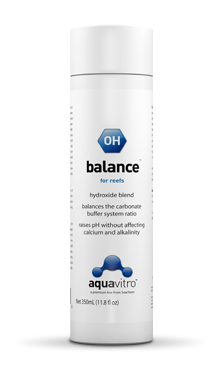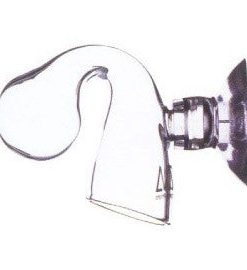Aquavitro Balance 350mL Seachem
$ 20,20 $ 12,12
- Balances the carbonate buffer system ratio
- Raises pH without affecting calcium and alkalinity
- Hydroxide blend
A frequent occurrence in reef systems is low pH, while calcium and alkalinity are at optimal levels. Raise one and the others may fall. One of the primary reasons for this is an improper carbonate/bicarbonate ratio. The buffer ratio changes as a natural consequence of the buffer’s ability to counteract acidifying sources such as organic acids (produced naturally from waste) or introduced from non-pH controlled husbandry products. In this case, adding more buffer would unnecessarily result in a rise in alkalinity and a drop in calcium. The first product of its kind, balance™ ends this see-saw effect. It resets this ratio by converting bicarbonate into carbonate in order to reassert a higher pH without affecting calcium level.
balance™ is an optimized blend of sodium and potassium hydroxides with a NSW ratio (27:1) of sodium to potassium to avoid ionic imbalance with long term use.
aquavitro offers other solutions designed to address the unique challenge of raising pH in a reef environment. ions™ addresses the problem of low magnesium which is a cause of low buffering pK and pH. eight.four™ addresses deficiencies in pK found in competing products by providing a properly balanced (carbonate/bicarbonate) buffer system.
Directions
balance™ is intended to be used to raise pH when all other parameters (alkalinity, calcium, magnesium) are at optimal levels, but pH is still low. The amount of balance™ needed to raise pH to the desired level will vary widely, depending upon the buffering capacity and quality of your tank water. For reference purposes only, one inner cap (7 ml) will raise 75 L (20 gallons*) of salt water by about 0.1 pH units.
Add balance™ in small increments, and check pH after at least 3 minutes before adding additional increments.
balance™ can be used daily and within minutes of calcification™, eight.four™, and ions™
Note: The aquavitro cap offers multiple dosing solutions depending on the size of your system. Each inner cap thread is approximately 2 mL. The inner cap contains 7 mL, while the outer ring contains 28 mL (35 mL when both are filled to the level of the inner cap.) When filled to the top, the cap contains 49 mL.
Fast Shipping and Professional Packaging
We can offer a variety of shipping options thanks to our long-term relationship with UPS FedEx DHL. Our warehouse staff will package all goods to our exacting requirements. Prior to shipping, your goods will be thoroughly examined and securely secured. We deliver to thousands of customers every day from all over the world. This is a sign of our determination to be the largest online retailer in the world. Warehouses and distribution centers are located throughout Europe as well as in the USA.
Note: Orders that contain more than one item will be assigned a separate processing time for each item.
Prior to shipment, we examine the items ordered thoroughly before sending the items. Most orders are shipped within 48 hours. The expected delivery time is 3 to 7 days.
Returns
The stock is constantly changing and cannot be fully controlled by us due to the involvement of many different parties, such as the factory and our warehouse. The levels of stock can change at any moment. You may not receive your order once the order has been made.
The policy is 30 days. If it's been longer than 30 days since you made your purchase and we're unable to offer you a complete exchange or refund.
To be eligible for a return your item must be unused and in the same condition as you received it. You must have the item in its original packaging.
Related products
Air Pump Accessories
Conditioner
Uncategorized
Plant Fertilisation
Bacteria
Plant Fertilisation
Air Pump Accessories
Filter Media
RO/DI
Plant Fertilisation
CO2 Accessories
Bacteria
Plant Fertilisation
Freshwater Plant
Air Pump Accessories
Plant Fertilisation
Substrate
Filter Media





































